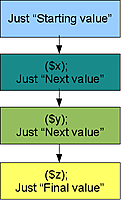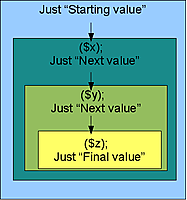I've been away for a while from Haskell so I thought I should do some revision
and really get my head around Monads. While I plodded through the wonderful
"meet the monads" tutorial, I decided that the best way to learn would be to do. By implementing Monads in Perl.
I'd highly recommend trying to implement monads in Your Favourite Language, if it
supports lambdas. Perl has already been done by
Greg Buchholz and rather nicely too, but there's no Monad library on CPAN
so I thought it would be worth a try.
First of all, the question of how to model "types" is easily resolved. We bless each
monad into the Monad class or a subclass. These can then have methods for
bind and return etc.
Now I do like the haskell >> and by a stroke of good fortune, Perl allows
us to overload that symbol too.
use overload '>>' => 'Bind';
I use the string 'Bind' rather than the reference \&Bind, so that
the subclasses can easily override it.
Some default bind methods in Monad.pm and Monad::Maybe etc.,
available here and
we have some simple examples like this one (in test.pl):
my $result =
(Writer 2) >>
L { my $x = shift; (Writer $x*2, "Doubled. ") >>
L { my $y = shift; (Writer $y+1, "Plus 1. ") >>
L { my $z = shift; (Writer $z*3, "Tripled $z. ")
}}};
Woot! OK, that's not entirely beautiful, but it's been slightly improved by the
overloading of >>.
The L lambda generator is also there for readability. It's basically defined as
sub L (&) { shift }
i.e. it's an identity function, but it's an L (like lambda) and to my mind, lined up on
the left, it looks pleasingly like "and then".
Nests
This didn't just fall straight out of the text editor into fully working code, of course.
A blow-by-blow account of me getting confused wouldn't be especially interesting, but one
big "aha" moment is worth pointing out. I realised that I was thinking of monads as being
a chain of lambdas, each one passing control to the next, like OO chaining:

But that doesn't work, as of course then the $x, $y,
$z of each scope would be separate, whereas in fact, in "later" sections, you
can refer to $x too. This implies that the model is more like a nest of lambdas:

This is made fairly clear in the Perl above, with its delimited braces, if you look at
where the closing "}" are, and which opening "{" they match up with.
This is an interesting mind shift, and one that I still haven't really fully grasped, as
I'll demonstrate a bit later.
Polymorphic functions on monads
In Haskell, you can call "return" in a monadic block to "lift" a value to
the appropriate monad. Similarly, you can call "fail", and the function
will fail in the right way (returning Nothing in a Maybe, throwing an error
in IO). This is a function call, not a method, so how does it know which monad to
behave as?
Of course Haskell does this with its strong inferencing typechecker. The
compiler "knows" that we are in Maybe, so "fail" will be fail :: Maybe.
Perl on the other hand doesn't have a strong type-inferencing compiler…
Right now I'm doing some shonky magic with caller() that works in this
very simple test case (and I believe only in this test case). I think I
could just simplify things and set a dynamic variable "$Monad::current_monad"
on the first occurrence of Bind. Yeah, global variables, yuck. The
final alternative that occurs to me would be to run the whole thing in a Reader
monad which just passes the name of the monad… but I'm fairly sure that's
slightly insane.
So what can it do right now?
The test script shows
the current capabilities. As of r246, I have Writer, Maybe, and List implemented (the
Monad superclass is effectively Identity).
I think Maybe is very useful – with some wrapper functions that raise Perl functions to
monadic ones using a variety of strategies (fail on undef/0/die etc.) it could be a useful
addition to the toolbox, simplifying a nested set of if checks.
The List monad already does list comprehensions, albeit with a rather yucky syntax.
Which is of course the big problem, 'cos Perl programmers (and this statement may surprise
non Perl programmers :-) are often obsessive about syntax.
Making it look pretty
OK, so we already added a bit of sugar with the >> overloading, and the
L function for lambda generators, but it's still rather ugly with the mix of
Perlish argument unpacking (my $x = shift), scope delimiters (}}}) etc.
Source filters!
The original Perl monad
tutorial used a source filter to give a monadic Do notation. It's a fairly
nice one as they go, but I don't really want to treat my program as a string if
I can help it, so let's look at some other techniques first!
Devel::Declare
Matt Trout has been working on some crazy parsing magic in
Devel::Declare.
This isn't a source filter, but (I think) hooks into Perl's parser to change the way that
subroutine declarations are parsed. It'd designed to give us parameter
unpacking, so that we could substitute:
L {my $x = shift; .... }
with:
L ($x) { .... }
In the current version this doesn't work (you can define L like that
easily, but the overloaded >> evidences a minor parsing bug
(you'd have to put the expression between parentheses to get the precedence
right, which loses the syntactic advantage we gain).
Still, hopefully will be fixed in a future release.
Generators
"Valued Lessons" has a beautiful post on Monads
in Python (with nice syntax!). The parenthesis is not hyperbole: the post describes
a monadic do block which looks about as pretty as Haskell's, but which works in a different
way. We spell 'bind' (Haskell's <-) as 'yield'. So a control sub
calls the 'do' block, gets out monadic values one by one as they are yielded back,
and deals with the nitty gritty of binding them to the rest of the generator.
It took quite a while to understand the Python code: in fact I'm not sure I understand
it fully, I really don't buy into the "Python is so easy to read" meme, and certainly
the "@whatever" syntax, which seems to be 'decorators' that modify the subroutine
that follows them, are rather confusing at first. But it's quite impressive, and it took
me a while to replicate in Perl.
First hurdle: Perl doesn't have generators. OK, that shouldn't be an issue, I thought,
because we have the CPAN. And yes, I found Brock Wilcox's
Coro::Generator.
This doesn't quite do what I want though. The yield only works one way, so
my $x = yield (Monad 3);
doesn't actually bind $x to 3. I asked Brock on IRC, and apparently this behaviour is
desired (I'm not quite sure why) so I forked his code to play with it :-)
Also, the coroutine restarts immediately it finishes, which is inconvenient.
Brock suggested yielding undef at the end, which is fine, I can do that from the
control sub.
(The Python version deals with finishing by throwing an exception, so perhaps
it has the same semantics?)
After a lot of ugly pain, I finally got this working, and we can now do:
my $result = Do {
my $x = yield (Just 3);
my $y = yield (Nothing);
my $z = yield (Just 5);
warn "x=$x, y=$y, z=$z";
Just 6;
Why the pain? Failing to understand coroutines while trying to use them to implement monads
(which I understand only very slightly) was a bad start. I found myself using the Do function
to repeatedly take a value from the generator and bind it with the next value (rather than
letting the monadic bind deal with those details). And even when I'd realised that the
sub that I needed to bind was a lambda that would abstract the details of invoking the coroutine,
I still ended up flailing around more or less at random till I finally got it working.
The current code is ugly (declared inline in test.pl rather than modularized) but
the result is pleasantly magical and readable.
Props of course to Python for having powerful techniques like yield and decorators
in core!
Hold the champagne
Of course the final test example, in the List monad doesn't work. Why? The List monad's
bind strategy is to call the function on every element of the list, so the coroutine will get
called repeatedly. And every time it's called, the execution pointer will move on.
I wonder whether the Python version has the same problem? I looked again at
the Coro modules on CPAN, and noted that they are advertised as being able to
implement "(non-clonable) continuations". I think this is the problem: I want to be
able to take the point at which the next Bind will be called, and call exactly that same
point multiple times (for the List monad). I asked various people including Brock again,
and Scott Walters (the authors of Continuity, a
continuation-based web application framework in Perl) and got the answer that Perl
really doesn't do proper continuations. (As far as I understood it, they're more or
less practically impossible, due to the way Perl models its execution context).
So, unless I've misunderstood (and please let me know if I have!) this technique is
limited to monads that only call the bound function once (e.g. most of them except List).
That's a shame though, as the List comprehension semantics would be lovely to express
in a monadic do block.
Meta continuations
The Valued Lesson post does implement continuations monadically… Could we do that
and then implement monadic do using these monadic continuations? I think the answer might be
"Yes but my brain would explode trying to implement it".
Plan B
I think that the most sensible method may be to take the contents of the monadic do
block and use the B:: modules to convert them from what looks like
my $x = bind ...;
to
... >> sub { my $x = shift;
. Which
is pretty much the approach of Greg Buchholz's source filter. But I think a parse
tree transformation may be more elegant. (This said, I don't know the Perl source
or understand the opcodes, so it may just be slightly crazy).
Update: Some discussion on reddit, as Vox still doesn't support OpenID